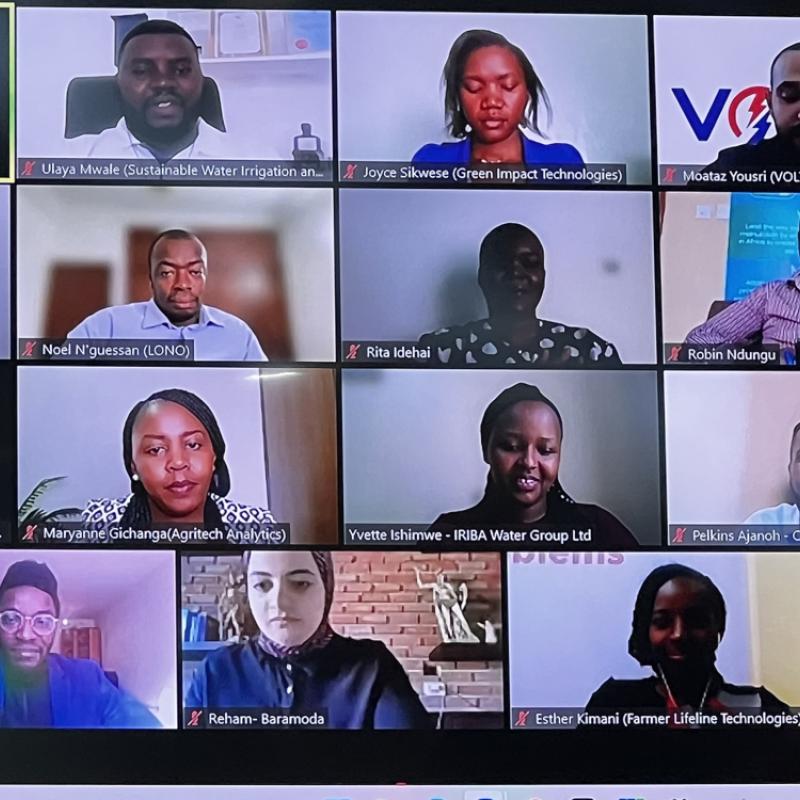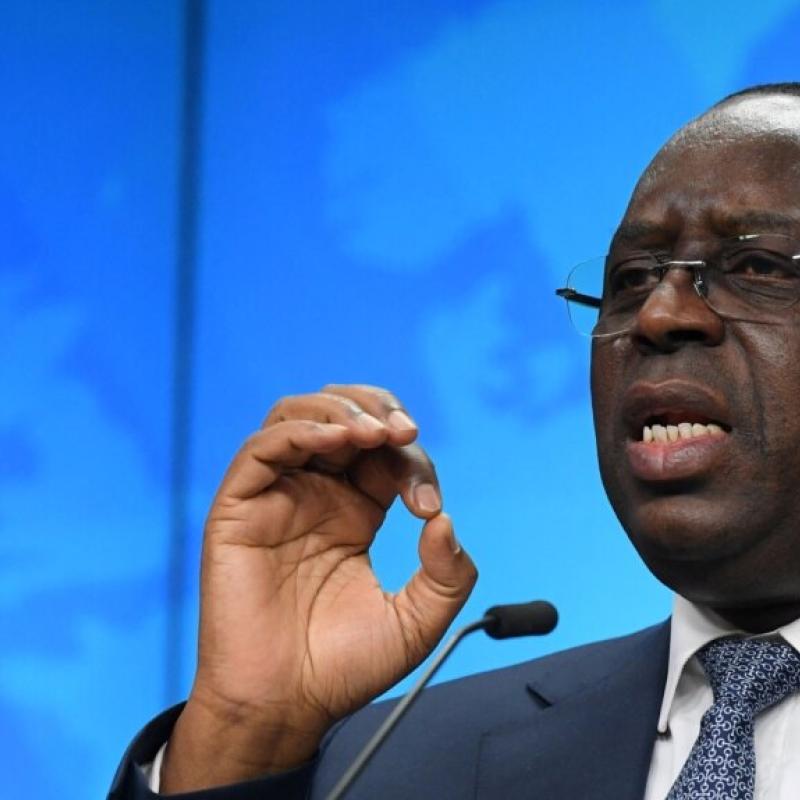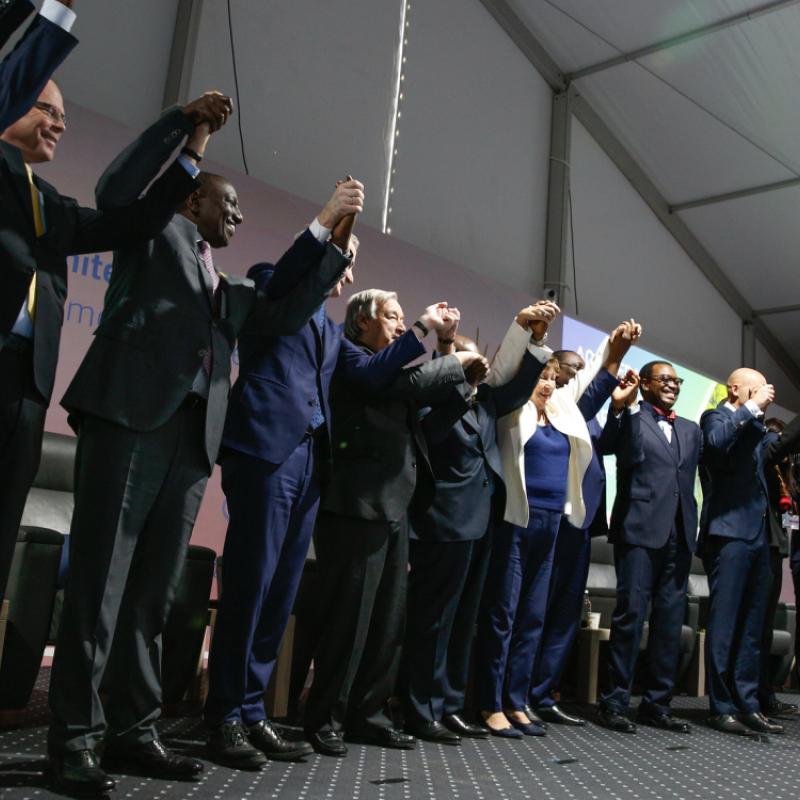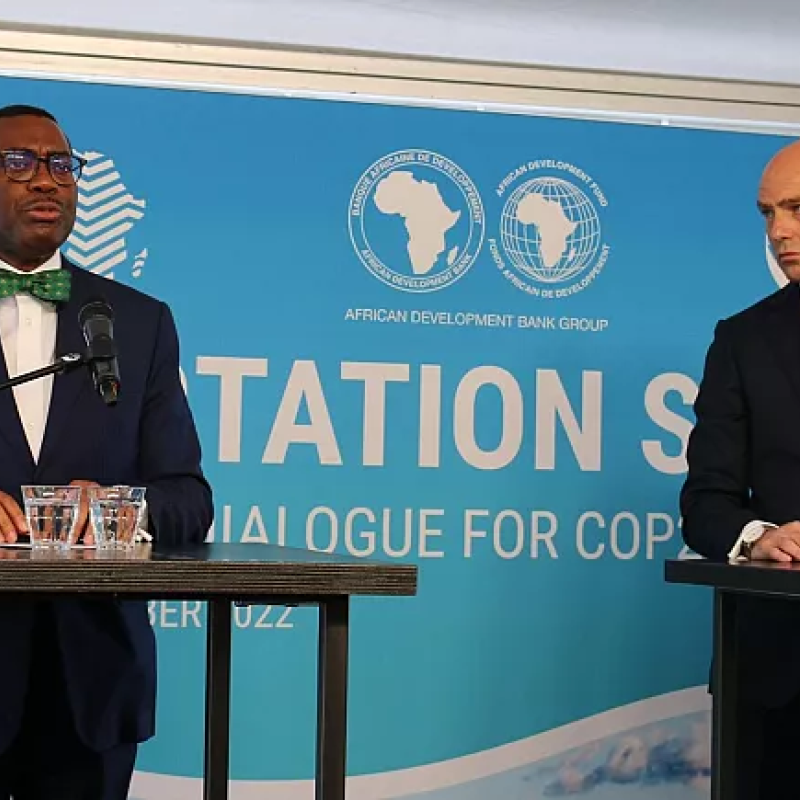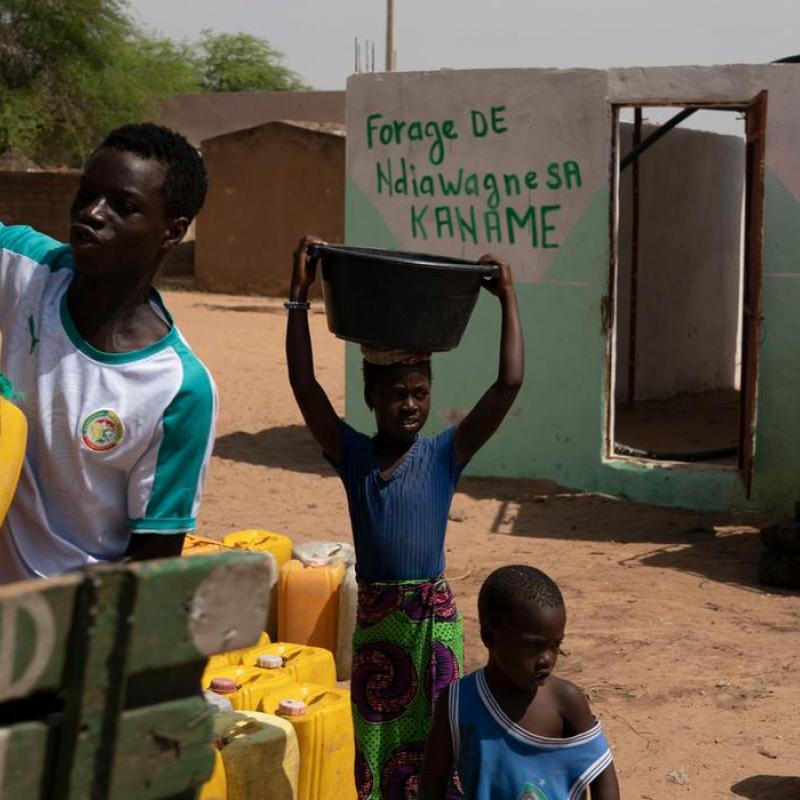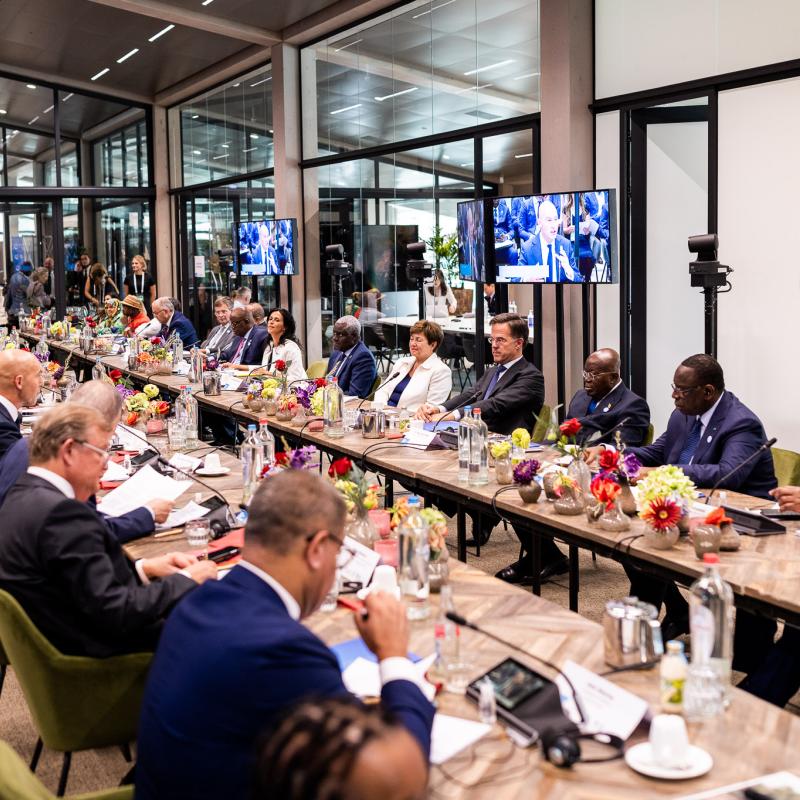
AAAP in the Media
Displaying 1 - 12 of 18
Global Leaders Rally Support and Finance for the Africa Adaptation Acceleration Program to Tackle Climate Change in Africa
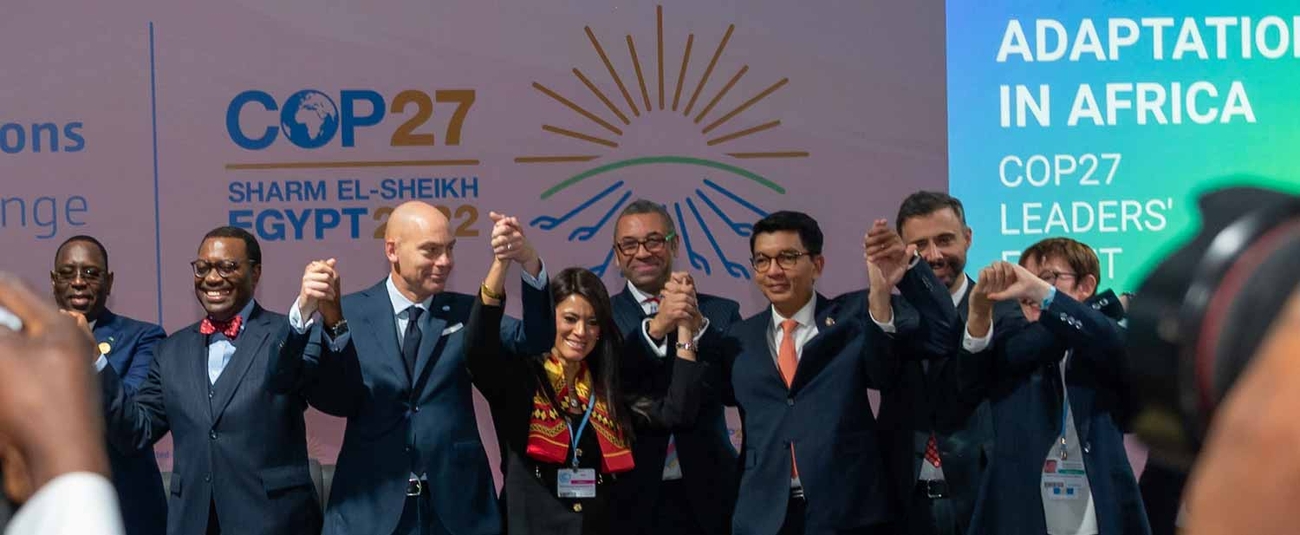
Global leaders on Tuesday rallied around climate adaptation for Africa. They attended the Africa Adaptation Leaders’ Event, convened by African Union Chair President Macky Sall of Senegal, Global Center on Adaptation CEO Patrick Verkooijen, and African Development Bank Group President Akinwumi Adesina.
The event took place at the global climate summit (COP27) in Sharm El-Sheikh, Egypt. It underscored the critical need for climate adaptation in Africa and responded to the call for the capitalization of the Africa Adaptation Acceleration Program (AAAP).
“This is a pivotal step in the fight against climate change,” African Union Chair President Macky Sall said. “The commitments made by Africa’s partners will give the Africa Adaptation Acceleration Program the boost that it needs to transform the development trajectory of the world’s most climate exposed continent. I am confident in the ability of the AAAP to deliver results for Africa.”
The Africa Adaptation Acceleration Program is an Africa-owned and Africa-led initiative developed by the Global Center on Adaptation (GCA) and the African Development Bank (AfDB) in close collaboration with the African Union. It serves as the implementation of the Africa Adaptation Initiative (AAI) to mobilize $25 billion to implement, scale and accelerate climate adaptation across the Africa. Since 2021, AAAP has mainstreamed climate adaptation in over$3.5 billion of investments in 19 countries.
United Nations Secretary-General António Guterres said: “I want to express my total solidarity for the Africa Adaptation Acceleration Program […] I urge the international community to support Africa to mobilize the technical & financial resources for scaling up transformative adaptation.”
“With this innovative program, Africa has developed a plan to grow, create jobs and opportunities for people, and to be resilient against the climate crisis,” said President Akufo-Addo of Ghana. “AAAP’s singular focus on the issue of climate adaptation will also contribute to greater stability and progress in Africa and around the world. AAAP is aligned with Ghana’s plans to address climate change as it chairs the Climate Vulnerability Forum (CVF) to lead efforts from the world’s most climate vulnerable countries to spur and mobilize investment through the Climate Prosperity Plans."
James Cleverly, Secretary of State for Foreign, Commonwealth and Development Affairs of the United Kingdom announced that the UK will provide £200 million to the African Development Bank’s Climate Action Window. This is in addition to the £20 million announced at COP26 in Glasgow to the AAAP Upstream Financing Facility.
Cleverly noted: “Climate change is having a devastating impact on countries in Sub-Saharan Africa facing drought and extreme weather patterns, which have historically received a tiny proportion of climate finance. This new mechanism […] will see vital funds delivered to those most affected by the impacts of climate change, much more quickly.”
Prime Minister Mark Rutte of the Netherlands followed through on the commitment made at the Africa Adaptation Summit held at the Global Center on Adaptation in September to confirm that the Netherlands will contribute EUR110 million to the AAAP, with EUR10 million in support for the Upstream Financing Facility hosted by GCA and EUR 100 million for the Climate Action Window of the African Development Fund at the African Development Bank as part of the Netherlands’ commitment to dedicate half of its climate funding, fully grant based, to climate adaptation, with a focus on Africa.
Norwegian Prime Minister Jonas Gahr Støre echoed African leaders’ calls for countries to rapidly scale up finance for climate adaptation, stating: “The climate crisis is here and now. Years of progress are at risk.”
“The AAAP Upstream Financing Facility is the delivery mechanism of adaptation and will use millions to leverage the billions that is required for adaptation,” he continued. “AAAP projects will generate effective climate adaptation outcomes. Adaptation is a growth agenda. A jobs agenda. And a prosperity agenda. On behalf of Norway, I am looking forward to continuing this partnership, investing in it, and supporting it with the Global Center on Adaptation.”
International Monetary Fund Managing Director Kristalina Georgieva emphasized the need to accelerate adaptation in Africa, stating: “It is paramount to support Africa’s adaptation because Africa will not reach its tremendous potential without it. AAAP complements the IMF’s Resilience and Sustainability Trust, which helps countries address external shocks such as climate change and ensure sustainable growth that can give Africa a chance to leapfrog outdated development models.”
African Development Bank Group President Dr. Akinwumi Adesina said: “Africa is suffering from the devastating effects of climate change. Our continent is being short changed by climate finance. The contributions towards the Africa Adaptation Acceleration Program’s Upstream Financing Facility and the Climate Action Window – which the African Development Bank manages – will help capitalize the program. With increased capital, we can better deliver the investment needed to bridge the adaptation finance gap. We want to ensure that the most vulnerable communities can benefit from a sustainable and prosperous future.”
Endorsing the outcomes of the high-level meeting, Patrick Verkooijen, CEO of the Global Center on Adaptation, closed with a statement emphasizing the AAAP’s impact to date, noting that “there is no pause button on the climate crisis. Africa must adapt to the threat of climate change, and it must adapt now.”
“Through the AAAP,” he continued, “Africa has charted its path towards a climate-resilient future for its youth, its economic growth, and for its prosperity.”
About the Global Center on Adaptation
The Global Center on Adaptation (GCA) is an international organization which works as a solutions broker to accelerate action and support for adaptation solutions, from the international to the local, in partnership with the public and private sector, to ensure we learn from each other and work together for a climate-resilient future. Founded in 2018, GCA is hosted by the Netherlands, working from its headquarters in Rotterdam with a knowledge and research hub based in Groningen. GCA has a worldwide network of regional offices in Abidjan, Côte d’Ivoire, Dhaka, Bangladesh and Beijing, China. Through this evolving network of offices and global and regional GCA teams, the organization engages in high-level policy activities, new research contributions, communications, and technical assistance to governments and the private sector.
About the African Development Bank
The African Development Bank Group is Africa’s premier development organization. Its overarching objective is to spur sustainable economic development and social progress in its regional member countries, thus contributing to poverty reduction across the continent.
The Bank Group achieves this objective by mobilizing and allocating resources for investment in African countries and providing policy advice and technical assistance to support development efforts.
In 2015, all multilateral development institutions agreed on the same set of objectives, the United Nations Sustainable Development Goals.
Learn more: https://www.afdb.org/
About the Africa Adaptation Acceleration Program
The Africa Adaptation Acceleration Program (AAAP) is a joint initiative of the African Development Bank and the Global Center on Adaptation (GCA). It aims to mobilize $25 billion, over five years, to accelerate and scale climate adaptation action across the continent. This ambition is delivered through the AAAP Upstream Financing Facility managed by the Global Center on Adaptation and the African Development Bank’s climate action window in the ADF replenishment. AAAP works across four pillars to achieve transformational results: Climate-Smart Digital Technologies for Agriculture and Food Security; African Infrastructure Resilience Accelerator; Youth Empowerment for Entrepreneurship and Job Creation in Climate Adaptation and Resilience and Innovative Financial Initiatives for Africa. AAAP has already guided over $3.5 billion of upstream investments in 19 countries with every dollar spent influencing $100 downstream.
COP27 - COP27 Leaders' Event, Accelerating Adaptation in Africa (DAY 2)
African and other global leaders meeting in Rotterdam say the continent is at a tipping point for climate adaptation action
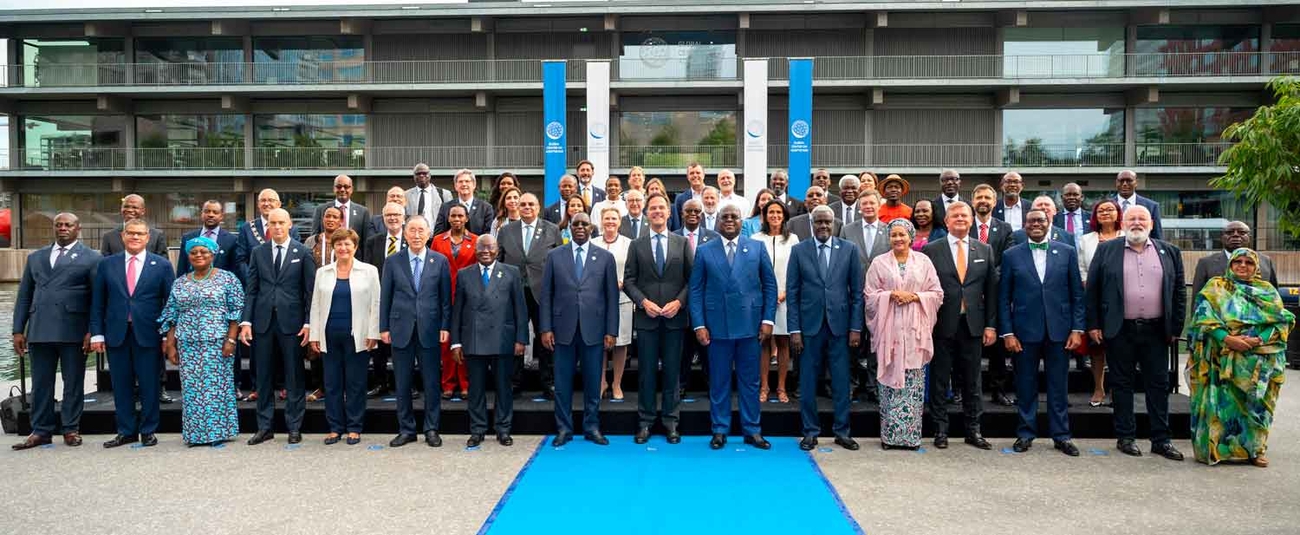
Two months to the 27th global climate summit (COP27) in Sharm El-Sheik, Egypt, African and other global leaders have rallied in Rotterdam, to highlight the urgency of climate adaptation funding for the continent.
The meetings—co-convened by the President of the African Development Bank Group Dr Akinwumi Adesina, CEO of the Global Center on Adaptation (GCA) Professor Patrick Verkooijen, and African Union Commission Chair Mousa Faki Mahamat—was unanimous about the need for concrete action and finance.
Former UN Secretary General Ban Ki-moon and GCA Co-Chair said: “The world has a fever. It burns hotter and higher with every day that passes… Statistics tell us that Africa is where the fever is at its most intense and people at the most vulnerable.”
GCA Co-Chair and Honorary Chairman of Royal DSM Feike Sijbesma spoke about the importance of support from the global private sector. He said 80% of the funding for adaptation needs to come from the private sector in both the developed north and the developing south.
GCA Chief Executive Officer Patrick Verkooijen emphasized the disastrous impacts of climate change hitting all parts of the world. He said it is in Africa, however, that climate shocks will hit the hardest. He said Africa was resolute about its economic advancement and would not stop. “Adaptation in Africa is like climbing a mountain. With all of you here today, we have the dream team that will climb the mountain together.”
Verkooijen added: “The next summit after today is Sharm El-Sheikh, the Africa COP. But success in Egypt will hinge on whether Africa’s needs are met or not. Africa has the commitment and the plan. That plan is the Africa Adaptation Acceleration Program (AAA-P). It is Africa-developed and Africa-owned. It was launched by Africa’s leaders, who are here today. It is the vehicle for delivering the Africa Adaptation Initiative.”
Established in 2020 by the GCA and the African Development Bank, the Africa Adaptation Acceleration Program lies at the center of climate action on the African continent. Participants acknowledged Verkooijen’s and Adesina’s joint efforts as the driving forces behind the program.
African Union Chairperson, President Macky Sall of Senegal, President Nana Akufo-Addo of Ghana, who is Chair of the Climate Vulnerable Forum, and President Felix Tshisekedi of the Democratic of the Congo conveyed a unified message: the international community must deliver on its pledge to double adaptation finance and to scale adaptation action for Africa.
President Sall expressed disappointment at the absence of industrialized country leaders at the summit. The African Union Chair said if African leaders could be in Rotterdam in person to discuss such a crucial issue as climate adaptation in Africa, the very least they expected was that their European counterparts—whose countries are among the world’s biggest polluters—would also have been present at the summit.
This sentiment was shared by Presidents Akufo-Addo and Tshisekedi, African Union Commission Chairperson Moussa Faki Mahamat and UN Deputy Secretary General Amina Mohammed, among others. Mohammed said: “A bird only flies with two wings, and the representation at this table is lopsided.”
The UN deputy chief added that it was not Africa’s fault that it is in its current position, given that it contributes very little to global carbon emissions. She pondered on what the situation would have been if the roles had been reversed. Mohammed said the COP26 Glasgow pact was at risk of failing if the developed world did not make good on its promises of delivering $100 billion a year for climate action in developing countries.
In his intervention(link is external), Adesina reminded participants that the African continent was warming faster than any other region of the world, as predictions from the Intergovernmental Panel on Climate Change show that the critical global warming levels will be reached much earlier in Africa.
The African Development Bank chief explained that in the face of the deluge, Africa does not have the resources to tackle climate change. He said the continent receives only 3% of global climate financing. He noted that if this trend continued, Africa’s climate financing gap could reach between $100 billion to $127 billion per year through 2030.
Adesina said: “The current climate financing architecture is not meeting the needs of Africa. New estimates by the African Economic Outlook of the African Development Bank show that Africa will need between 1.3 and 1.6 trillion dollars from 2020 to 2030, or $118 billion to $145 billion annually to implement its commitments to the Paris Agreement and its nationally determined contributions.”
The African Development Bank chief said the African Adaptation Acceleration Program’s upstream facility at the GCA had already helped to generate $3 billion of mainstreamed climate adaptation investments by the African Development Bank, from agriculture to energy, transport, water, and sanitation.
Adesina spoke of the African Development Bank’s African Development Fund (ADF), its concessionary lending arm as one of the ways to address the climate financing gap. He said the 16th replenishment of the fund, currently underway, presented a unique opportunity for full financing of the $12.5 billion in financing for the Africa Adaptation Acceleration Program.
The African Development Bank chief explained that the African Development Fund had introduced a Climate Action Window that would hopefully mobilize $4 billion to $13 billion for climate adaptation for the Fund’s member countries. “This will be used to support 20 million farmers with access to climate resilient agricultural technologies, access of 20 million farmers and pastoralists to weather-indexed crop insurance, reviving 1 million hectares of degraded land, and provision of renewable energy for about 9.5 million people.
Adesina said commitments by developed countries to provide $100 billion annually in climate finance for developing countries was long overdue. “Africa cannot wait,” he emphasized. “This is the time to support the Africa Adaptation Acceleration Program. This is the time to support the ADF 16th replenishment. This is the time to support the Climate Action Window of ADF-16.”
World Trade Organization Director General Ngozi Okonjo-Iweala also lent her voice to the clarion call for additional resources for Africa adaptation funding. Speaking about the role of trade in climate adaptation, she said trade policies should be integrated into global climate action as an amplifying force for financing and other climate-related support provided to vulnerable economies.
The summit’s five-point Communique(link is external) highlighted that Africa was at a tipping point. It emphasized that success at COP27 will depend on whether the needs of Africa, the world’s most climate-vulnerable continent, are met with finance flowing into such key country-led adaptation programs as the Africa Adaptation Acceleration Program.
GCA Co-Chair Feike Sijbesma said in closing: “Investments in global climate adaptation cooperation are a big opportunity for countries like the Netherlands to share some of our best innovations with those who need them the most. The AAAP will be a crucial vehicle for triggering far greater business investment across Africa into green and resilient solutions. This is a collective effort, we need every sector, every contribution possible to see off the climate crisis in Africa, and the private sector, in particular, has a massive role to play.”
Unlock the impact potential of agricultural SMEs in Africa, experts urge at Dakar 2 Food summit
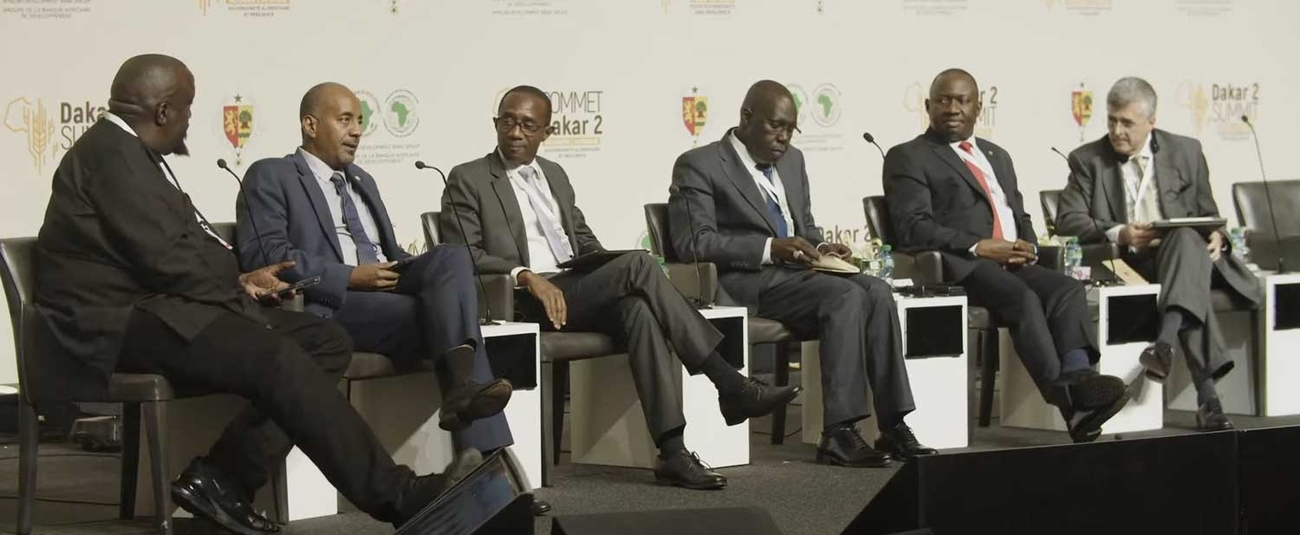
Global experts meeting during a panel session at the second international summit on food production in Dakar called for accelerated avenues to close the financial gap in agriculture and address barriers to the growing finance market for agricultural Small and Medium Enterprises (SMEs).
The discussions come in the wake of supply chain disruptions as a result of COVID-19 pandemic, the war in Ukraine, rising inflation, high commodity prices that have led to increased food and nutrition insecurity.
The session, titled, Closing the Financing Gap was moderated by Alan Kasujja, Presenter, BBC World Service.
At the summit, the African Development Bank Group and the Government of Canada announced the establishment of a new special fund to support Africa’s small and medium-sized enterprises (SMEs) in the agriculture sector.
The Agri-food SME Catalytic Financing Mechanism aims to catalyze and de-risk investment for agriculture SMEs. It will also strengthen agricultural value chains and improve food security across the continent.
The experts urgedlenders to explore blended finance to help de-risk agricultural transactions, reduce transaction costs and attract private financing by improving the risk-return ratios.
“A key challenge of the sector is the understanding of the risks…We need blended finance for things that are riskier to be done,” said Wagner Albuquerque de Almeida, Global Director for Manufacturing, Agribusiness and Services at the International Finance Corporation (IFC).
Trade and Development Bank head Admassu Tadesse said financing agriculture is not as risky as is often perceived. “It depends on which part of the cycle. We focus on the tail end, where is there is low risk,” he said.
Agri-SMEs’ biggest sources of financing are local commercial banks. However, banks prefer to invest in larger, more mature enterprises such as established aggregators and local processors who command regional or national market, Tadesse noted.
Danladi Verheijen, Co-founder and CEO of Verod Capital, a private equity investment firm, stressed that agriculture should be seen as an investment opportunity.
“Investors want to get in where there are high returns,” he said. He noted that one of the challenges in agriculture is finding the scale of businesses attractive enough for financial intermediaries to engage with them.
Panelists also noted that food value chains in Africa are currently not set up to maximise the potential of our food system. This growing realization has jolted players in Africa’s agricultural sector to seek practical solutions to restore the continent’s food security.
There is vast potential for establishing production and trade links, as well as synergies between different actors along the entire agribusiness value chain : producers, processors and exporters.
“All the elements need to come together. You need to have an ‘airbag’ if things go wrong,” said Dr. Heike Harmgart, Managing Director for the Southern & Eastern Mediterranean, European Bank for Reconstruction and Development.
Speakers also urged farmers and agri-SMEs to “reclaim their power” through cooperatives. “We need to help them to be organised to create clusters, and cooperatives and to create a sense of professionalization into the sector”, said Albuquerque de Almeida
Agreeing with Almeida, Dr. Olagunju Ashimolowo, the Vice President, Operations for ECOWAS Bank for Investment and Development urged governments to identify cooperatives to manage farmers. He also asked livestock owners to properly channel the funds in a way that would be “attractive and bankable.”
The African Development Bank’s Africa Adaptation Acceleration Program (AAAP) digital agriculture annex is deploying digital technologies targeted at smallholders, agri-SMEs and value chain actors to build actors to use digital technologies in agricultural practices.
20 young African entrepreneurs bag $100,000 each to boost their climate adaptation businesses
African leaders aim to put climate finance top of COP27 agenda
Millions pledged at Africa adaptation acceleration event
Rich nations pledge funds at Africa climate crisis summit
African leaders push to secure climate adaptation funding
Senegal Integrated Resilient Transport Project
Senegal faces significant risk due to climate change, which affects the transport sector in multiple ways. Most impacts relate to extreme weather and hydrologic events, like torrential rain, storms and extreme wind, sea surges, flooding or heatwaves which are likely to occur more frequently in future due to climate change. These events cause damages to costly transport assets but also disrupt services provided through these assets.
Damages to assets, loss of lives and economic production loss associated with floods along the coast in 2017 were estimated to cost Senegal economy a total of $230 million or 1.4% of GDP. In the greater Dakar region, floods in 2009 affected approximately 380,000 people with losses estimated to be roughly US$82mn, of which damages and losses in the transport sector were estimated to be US$ 11mn. The City of Dakar’s annual budget, in comparison, is approximately US$ 70mn.
The project objectives include: i) improving the overall operation of the transport system to support the accelerated growth strategy and promote regional integration; and (ii) providing a rapid link between the heart of Dakar and St Louis through the ‘gateway’ for the northern cities to help establish the region as a new economic development pole, through following African Development Bank Projects, the $117 Million Dakar Transit Network Project and the $181.9 Million Dakar-St Louis HW Project
The development and rehabilitation of transport infrastructure in Dakar will also contribute to the achievement of national development goals for a low-carbon, integrated public transport system including the Regional Express Train (TER) and the Bus-Rapid Transit (BRT).
- High-resolution, asset-level climate risk and vulnerability assessments to quantify climate risk to the transport assets
- Innovative solutions for climate smart transport asset management through the climate risk and vulnerability assessment
- Capacity enhancement for resilient transport sector planning through two broad activities:
- Masterclass for Climate Resilient Infrastructure PPPs: Upstream TA and capacity building to mainstream resilience for infrastructure PPPs.
- Adapt Now Challenge on Unlocking Digital Solutions for Resilient Transport in partnership with AAAP’s Youth and Jobs pillar
- Conduct a national transport adaptation needs assessment to ensure that resilient assets translate into resilient services in the transport sector requires analysing climate impacts through a systems approach
- Identification of adaptation needs at a national scale to inform downstream investments from the government and other development partners
- Development and rehabilitation of 30 km roads and networks, 13 bus terminals, 77 stops, and 2 depots for storage and maintenance within the African Development Bank Dakar Transit Network Project
- Construction of 80km of highway lanes on private financing and 120km on public funding, as well as interchanges, recovery lanes and lower crossings within the African Development Bank Dakar-St Louis Highway Project
- Development of runways, roads with solar public lighting, development and/or rehabilitation of social and commercial infrastructure, and restoration of natural assets
- Acquisition of rolling stock, implementation of integrated systems, and institutional, financial, and operational structuring of the network operations
- Technical assistance for the development of complementary studies, capacity building and gender-responsiveness
- Improvement of performance of transport services (reduce number of accidents, increase flow capacity, improve traffic and safety conditions, and improve access to social service and facilities
- Contribution to economic development and trade flows
- Reduced vulnerability of population in the area
EUR 155,000 from the AAAP Upstream Facility
Global and African Leaders Welcome Launch of GCA Africa as “Historic Moment to Accelerate Adaptation” on the Continent
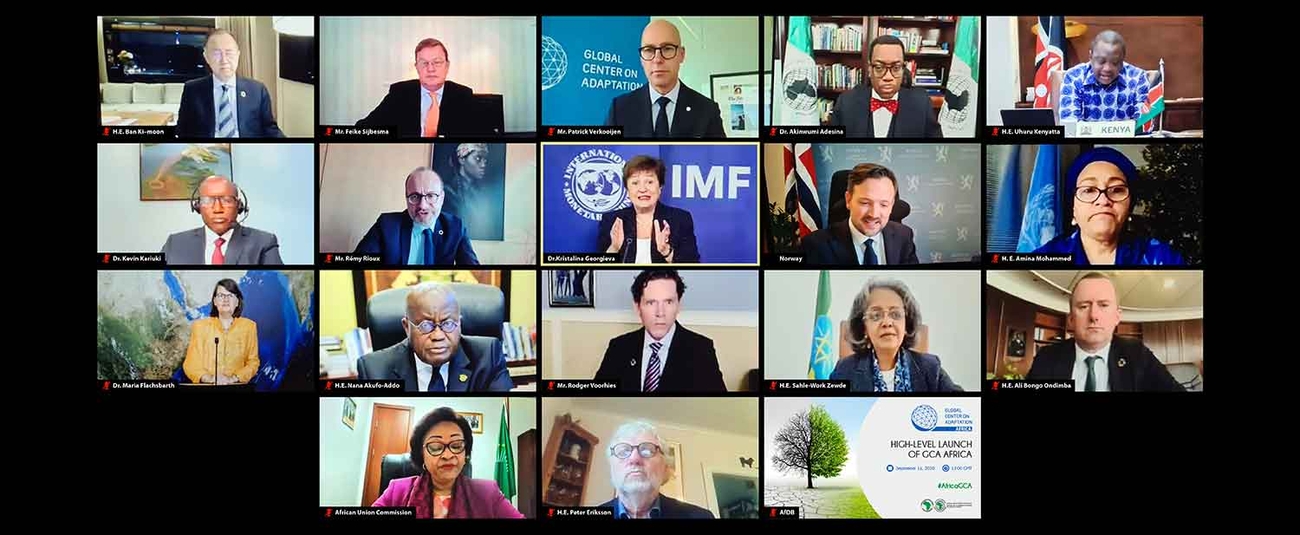
The Global Center on Adaptation today announced the launch of its regional office in Côte d’Ivoire.
Hosted by the African Development Bank at its headquarters in the Ivorian capital Abidjan, GCA Africa will work with partners across the continent to scale and accelerate adaptation action that protects African communities from the impacts of climate change.
GCA Africa will focus on programs and action, knowledge acceleration and capacity building and agenda-setting that respond to the acute challenges from the changing climate facing African countries.
The GCA Africa programs include improving the food security of one billion people in Sub-Saharan Africa by 2030 through a program on rural well-being and food security, as well as projects to support communities through water for urban growth and resilience; using nature for more resilient infrastructure; adaptation finance and building youth leadership.
Commenting on the launch, Ban Ki-moon, Co-Chair of the Board of the Global Center on Adaptation and 8th Secretary-General of the United Nations said:
“This is a historic moment to accelerate adaptation in Africa. Nowhere is the challenge of achieving sustainable development in the face of a changing climate more acute. Our new regional office will support regional and national adaptation efforts by emphasizing and spreading existing best practices on the continent and ensuring their fully fledged integration into broader international adaptation efforts”.
Dr. Akinwumi Adesina, President of the African Development Bank said:
“I am delighted with the launch today of the Global Center on Adaptation for Africa (GCA) hosted by the African Development Bank. The Bank has committed to doubling its financing for climate to $25 billion by 2025, with over 50% devoted to climate adaptation. Africa must not be short-changed by global climate finance. We will partner with the GCA to mobilize more resources for climate adaptation in Africa.”
Ali Bongo Ondimba, President of Gabon and Chair of the African Adaptation Initiative said:
“The devastating effects of climate change, which include severe droughts, floods, reduced agricultural yields, sea-level rise, and other climate-related disasters, are on the rise. The launch of GCA Africa is a bold and innovative initiative to galvanize the support needed to significantly scale up adaptation on the continent, identify gaps and connect regional partners to find solutions.”
Quotes from other partners:
Kristalina Georgieva, Managing Director, International Monetary Fund said:
“More than any other region, sub-Saharan Africa is vulnerable to the impact of climate change, which threatens lives and livelihoods and undermines economic growth. After the current crisis, boosting resilience is an urgent priority so it’s vital we share the knowledge and best practice that can help accelerate climate adaptation.”
Amina J. Mohammed, Deputy Secretary General of the United Nations said:
“There is an urgent need to step up the support for people in Africa, and around the world, affected by climate change. I welcome the Global Center on Adaptation Africa as a crucial partner in delivering the elevated ambition and enhanced action that is needed to make this shift towards a resilient future.”
Feike Sijbesma, Co-Chair of the Board of the Global Center on Adaptation and Honorary Chairman of Royal DSM said:
“Millions of lives depend on Africa’s agricultural sector. Adapting and improving its resilience to climate change is therefore a must. By investing in African local food systems we catalyze sustainable value chains and support the vulnerable but small-scale often female producers.”
Nana Akufo-Addo, President of Ghana said:
“Adaptation to the impact of our changing climate is essential if Ghana is to continue to grow and prosper. We look forward to working with GCA and its partners to meet the challenge of climate change and ensuring resilience is built into Africa’s economic recovery plans.”
Dag-Inge Ulstein, Minister of International Development for Norway said:
“Climate change is not only damaging for the environment, but devastating also for development. It is important that countries around the world, especially our partners in Africa, work together to address these global challenges. Norway is pleased to be able to support GCA Africa in accelerating this agenda.”
Peter Eriksson, Minister for International Development Cooperation for Sweden said:
“GCA is a key solutions broker and center of excellence with a holistic approach that aims to accelerate adaptation solutions for a climate-resilient future in Africa. By working with GCA Africa we will intensify climate adaptation efforts to ensure we integrate solutions to have a coherent response to our climate emergency.”
Patrick Verkooijen, CEO of the Global Center on Adaptation said:
“The impacts of climate change are already being felt across Africa and will only increase in magnitude. Adaptation is not a nice-to-have, it’s a necessity. Through our role as a solutions broker, GCA Africa will work closely with partners in every sector to ensure the most effective adaptation measures are shared and scaled across the continent, responding to the growing demand for strengthening resilience to the impacts of our changing climate.”
The launch of GCA Africa comes shortly after the launch of its South Asian office in Dhaka by Prime Minister Sheikh Hasina in September 2020. Its first regional office was launched in Beijing by Premier Li Keqiang in June 2019.
In May 2020, GCA Africa published a GCA policy brief(link is external), with the African Adaptation Initiative and endorsed by 54 Heads of State and Government, which recommended focusing stimulus investment in Africa on resilient infrastructure and food security to overcome the COVID-climate crisis.
The GCA is the lead partner institution for the Climate Adaptation Summit in the Netherlands – the first major gathering of international leaders dedicated entirely to adaptation. The summit takes place on 25 January 2021 and is hosted by Prime Minister Mark Rutte of the Netherlands. The GCA is also the Managing Partner to the Climate Vulnerable Forum and Vulnerable Twenty (V20) Group of Ministers of Finance, a group of 48 developing countries highly vulnerable to climate change.
Watch the launch at the following links:
About the Global Center on Adaptation
The Global Center on Adaptation (GCA) is an international organization which works as a solutions broker to accelerate action and support for adaptation solutions, from the international to the local, in partnership with the public and private sector, to ensure we learn from each other and work together for a climate resilient future. Founded in 2018, the GCA is hosted by the Netherlands. Through an evolving network of offices and global and regional GCA teams including a global innovation hub for climate adaptation launched by Premier Li Keqiang in Beijing, the organization engages in high-level policy activities, new research contributions, communications, and technical assistance to governments and the private sector.


